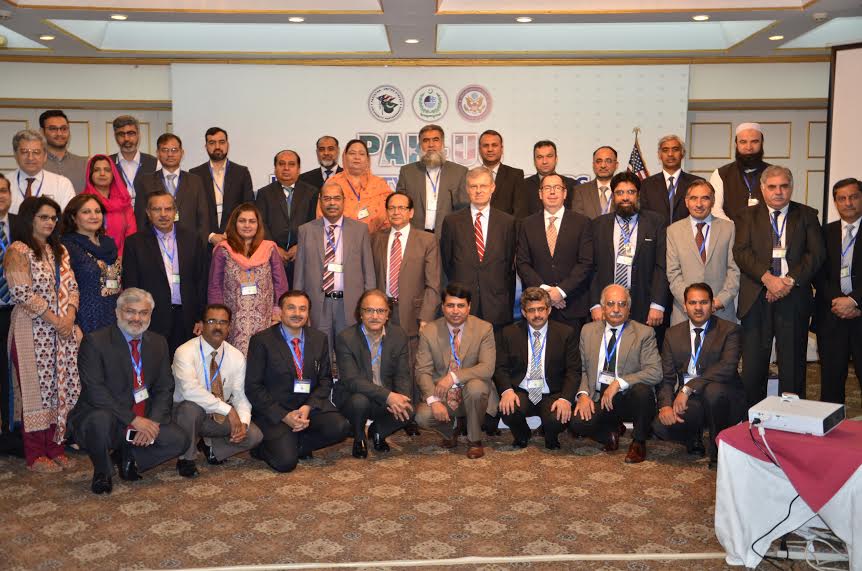ISLAMABAD ( BMZ REPORT )
The Higher Education Commission (HEC) Pakistan in collaboration with the US Embassy organized a daylong Pakistan-US University Partnerships Follow-up Workshop at a local hotel to share best practices in these partnerships.
In his welcome address, Dr. Arshad Ali, Executive Director, HEC said the partnerships among the higher education institutions of the two countries will go a long way in achieving remarkable outcomes and targets. He said the partnerships are helping promote higher education in Pakistan as the country’s universities are utilizing the experiences of US partners. He hoped that both the sides will together benefit from these initiatives.
Stressing the need for a way-forward to sustain these partnerships, he said the constraints lying in the way of accomplishing objectives of this flagship programme should not be allowed to disturb it. He admired the US Government, people and the US Embassy in Islamabad for their generous support to the people of Pakistan by taking keen interest in becoming of part of HEC’s efforts to promote higher education in the country.
Mr. Jeffery Sexton, Minister Counselor, US Embassy, Islamabad shared an overview of the partnerships between the universities and appreciated HEC for its endeavours to make the programme a success. “These partnerships show HEC’s commitment to academic uplift,” he maintained.
He said the targets achieved through the programme so far reflect the mutual interest of Pakistani and US partners, adding that these partnerships are playing a significant role in building the bilateral relations. He observed that the partnerships have given a new perspective to scholars and critical thinking to faculties, who have witnessed new teaching styles. He hoped that the mutual collaboration will thrive in the years to come.
Speaking on the occasion, Dr. Mahmood-ul-Hassan Butt, Consultant HEC shared the core aims of HEC with the workshop participants. He said when HEC was established, it concentrated on three areas including increase in equitable access to higher education, quality, and relevance of programmes to country’s socio-economic growth.
He also highlighted the key expectations associated with the Pakistan-US University Partnerships Programme. He said the programmes covered many subjects including architecture, psychology, computer science, post-doctoral research, development of English language faculty, social sciences, and business management. He said the programme helped learning different ways of university administration, various kinds of research, and classroom management skills, adding that it paved the way for Pak-US strategic dialogue in various fields including S&T. He also highlighted the role of working groups in making the partnerships more useful.
Referring to the concept of Pak-US Knowledge Corridor, Dr. Butt said the idea to have a knowledge corridor with the United States was evolved last year under the agenda of improved educational collaboration. “This will help Pakistani universities learn about the system of US higher education institutions and will lead to the transfer of this system to Pakistan,” he asserted. He continued to say that under Pakistan-US Knowledge Corridor, as many as 10000 new PhDs will be produced during the next 10 years.
During the course of workshop, participants from different universities shared the outcomes of different projects run under the Pak-US University Partnerships Programme. Mr. Ahmed Saeed, Deputy Director, Arizona State University (ASU) shared how the ASU is helping National University of Science & Technology (NUST), Islamabad and University of Engineering & Technology (UET), Peshawar in setting up Centres of Advanced Studies in energy. He said apart from ensuring technical support, the ASU has provided Rs. 15 million to each of the university for the purpose, adding that each of them have also been extended Rs. 5 million for construction work. He said the ASU is assisting the two universities in various areas like governance, curriculum development, exchange of faculty, and sustainability.
In her presentation, Ms. Sarwat Rasool, a representative of Fatima Jinnah Women University (FJWU), Rawalpindi briefed the participants about the experience of FJWU partnering with the University of Texas, Auston. She said the two universities have multi-disciplinary partnership, adding that the areas encompassed under the partnership include Behavioral Sciences, Media, Gender Studies, and Fine Arts. Revealing the goals of partnership, she said the partnership aims at enhancement of research, development of courses, and cultural awareness.
Mr. Mujahid, Lecturer at National College of Arts told the workshop participants about the MoU signed between the NCA and University of Texas, Austen. He said the two institutions partnership was initiated in Fall 2015 and it will culminate in Spring 2018. He said the areas covered under the programme include collaborative research, curriculum development, resource sharing, faculty and student exchange, and professional growth of faculty by the US counterparts.
Prof. Dr. Zakariya Zakir from University of the Punjab apprised the participants of the PU partnership with Arizona State University in Sociology and Development Students. He said the partnership was recently marked, adding that it was a good start with collaboration in faculty development, research projects, and formulation of curriculum.
Mr. Zahid Majeed, Director, International Collaboration & Exchange Office, Allama Iqbal Open University (AIOU), Prof. Nisar Siddiqui, Director/ Vice Chancellor, IBA Sukkur, and Mr. Waseem Hashmi Syed, Adviser, HRD, HEC also delivered presentations on Pakistan Distance Education Enhancement Programme, a partnership between AIOU and San Jose State University, community colleges, and Pak-US Fulbright Scholarship Programme respectively.
Later, the workshop participants took part in a discussion on ”How to Sustain the Partnerships after Formal Conclusion” and ”Challenges and Opportunities in Partnerships”. They termed continuation of Pak-US collaboration imperative for transfer of ideas and experiences on the two sides.

